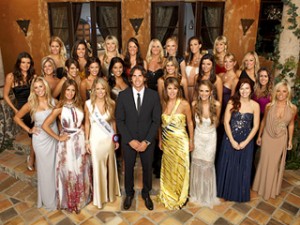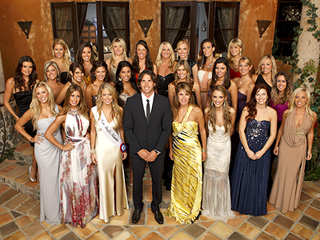‘Bachelor’ threatened with racial discrimination lawsuit, experts weigh in

News broke Tuesday that Nathaniel Claybrooks and Christopher Johnson, two African-American football players from Nashville, are holding a press conference Wednesday to discuss their decision to file a class action lawsuit against ABC’s The Bachelor on behalf of “all persons of color who have applied for the role of The Bachelor or Bachelorette but been denied the equal opportunity for selection on the basis of race.” The players say they plan to target ABC, Bachelor executive producer Mike Fleiss, and the show’s production companies (which include Warner Horizon Television, Next Entertainment, and NZK Productions).
The release announcing the conference noted that, “Over a combined total of 23 seasons, neither show has ever had a Bachelor or Bachelorette of color.”
EW reached out to entertainment lawyers who specialize in discrimination cases and are based in California (where The Bachelor is filmed) to provide some insight. The lawyers admitted this was an unprecedented case in many ways. “I’ve watched that [area of law] like a hawk, and I haven’t seen a case like this before,” said Jeffrey S. Kravitz of Fox Rothschild LLP. Though facts on the potential case are still uncertain (Claybrooks and Johnson plan to formally file their suit on Wednesday), this kind of case could be a game-changer.
For starters, neither man ostensibly has been a contestant on the show — a major stumbling block. Even if they had, though, “When you sign up on a reality TV show, you do not sign up as an employee — you sign up as an independent contractor,” said Kravitz. “They’re likely going to sue for civil rights violations or perhaps claim that they’re de facto employees… [but] the case law is all over the board in terms of that across the country.”
Since Claybrooks, Johnson, and their lawyers are based in Tennessee, they have the option to file suit in either California or Tennessee, though Andrew H. Friedman of Helmer & Friedman LLP suggested they’d be better protected in California. That state has a provision called the Unruh Civil Rights Act. “They would definitely have much more legal protection in California than they would in Tennessee,” he said. This could include eligibility for emotional distress damages and “possibly punitive damages if the decision to exclude African-Americans were made at a high enough level of the production company.” That’s in addition to the potential economic damages that could be proved, for example, by looking at other Bachelor/Bachelorette contestants and seeing how they parlayed their fame into endorsements deals and further earnings.
So how might Claybrooks and Johnson prove their case? That’s where things get interesting. According to Friedman, the plaintiffs could depose former producers on The Bachelor and The Bachelorette and requisition everything from contestant applications to internal production memos during the discovery process. “The entertainment industry isn’t known for necessarily being politically correct in terms of their internal e-mails,” he noted, “so I wouldn’t be surprised — if in fact this was going on — for there to be e-mails” proving as much.
In the end, it could also be up to ABC, Next and the other defendants to prove they made a good faith effort to recruit contestants of color. “If the [production company] says, ‘We interviewed x number of minority candidates,’ they’re going to be in better standing than if they only interviewed one,” said Kravitz. “They’re going to be in better standing if they can show a history of enrollment of minority candidates than if they can’t. Beyond that, they don’t control who the Bachelor or Bachelorette picks.” Agreed Jay MacIntosh, “Circumstantial evidence will be important in a case like this. It goes to pattern and practice as to racial profiling.” That said, the proof will be in the papers, which have yet to be filed. Until the specifics of the discrimination allegations come out, Kravitz warned, “These are just allegations at this point.”

